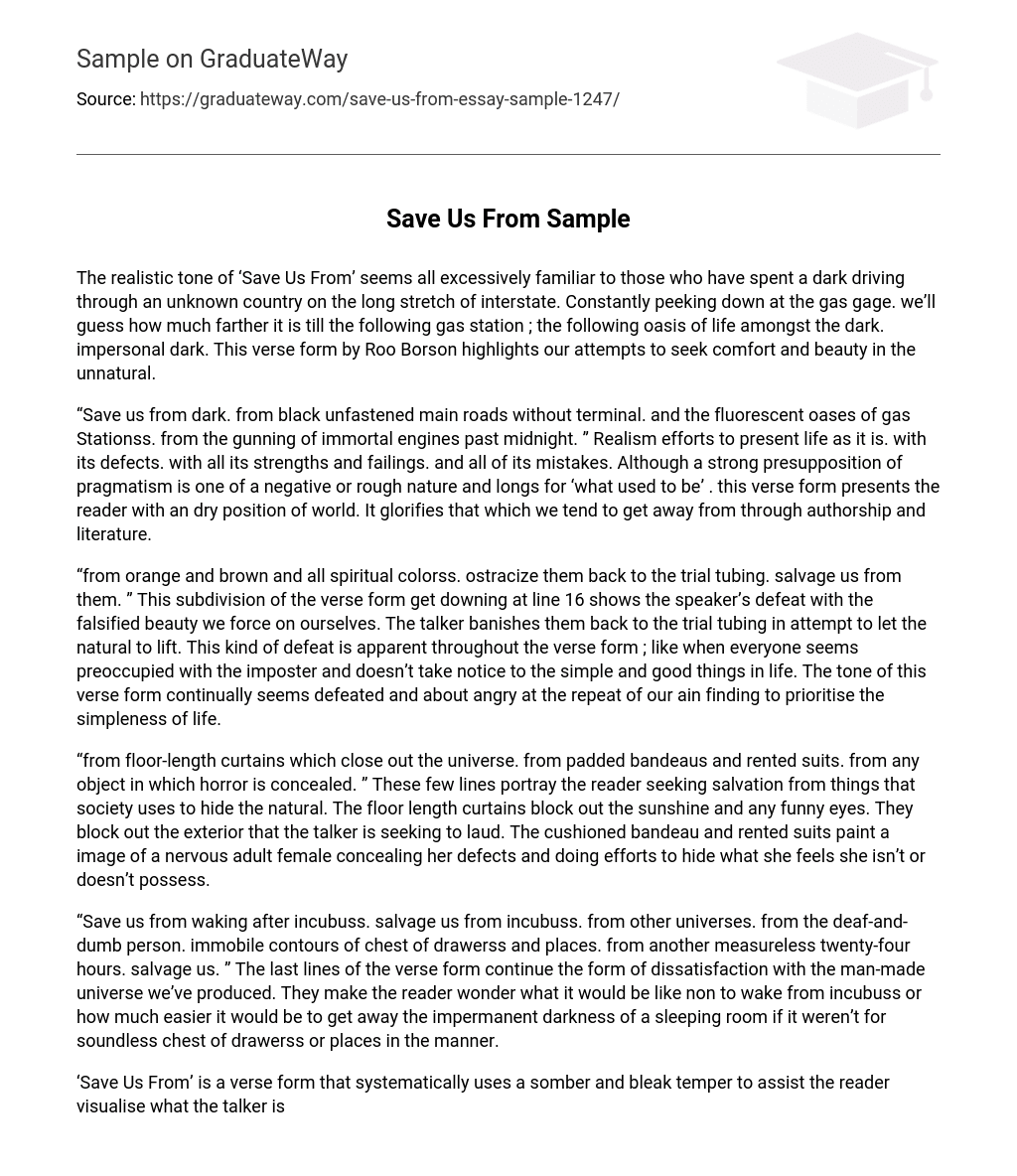The realistic tone of ‘Save Us From’ seems all excessively familiar to those who have spent a dark driving through an unknown country on the long stretch of interstate. Constantly peeking down at the gas gage. we’ll guess how much farther it is till the following gas station ; the following oasis of life amongst the dark. impersonal dark. This verse form by Roo Borson highlights our attempts to seek comfort and beauty in the unnatural.
“Save us from dark. from black unfastened main roads without terminal. and the fluorescent oases of gas Stationss. from the gunning of immortal engines past midnight. ” Realism efforts to present life as it is. with its defects. with all its strengths and failings. and all of its mistakes. Although a strong presupposition of pragmatism is one of a negative or rough nature and longs for ‘what used to be’ . this verse form presents the reader with an dry position of world. It glorifies that which we tend to get away from through authorship and literature.
“from orange and brown and all spiritual colorss. ostracize them back to the trial tubing. salvage us from them. ” This subdivision of the verse form get downing at line 16 shows the speaker’s defeat with the falsified beauty we force on ourselves. The talker banishes them back to the trial tubing in attempt to let the natural to lift. This kind of defeat is apparent throughout the verse form ; like when everyone seems preoccupied with the imposter and doesn’t take notice to the simple and good things in life. The tone of this verse form continually seems defeated and about angry at the repeat of our ain finding to prioritise the simpleness of life.
“from floor-length curtains which close out the universe. from padded bandeaus and rented suits. from any object in which horror is concealed. ” These few lines portray the reader seeking salvation from things that society uses to hide the natural. The floor length curtains block out the sunshine and any funny eyes. They block out the exterior that the talker is seeking to laud. The cushioned bandeau and rented suits paint a image of a nervous adult female concealing her defects and doing efforts to hide what she feels she isn’t or doesn’t possess.
“Save us from waking after incubuss. salvage us from incubuss. from other universes. from the deaf-and-dumb person. immobile contours of chest of drawerss and places. from another measureless twenty-four hours. salvage us. ” The last lines of the verse form continue the form of dissatisfaction with the man-made universe we’ve produced. They make the reader wonder what it would be like non to wake from incubuss or how much easier it would be to get away the impermanent darkness of a sleeping room if it weren’t for soundless chest of drawerss or places in the manner.
‘Save Us From’ is a verse form that systematically uses a somber and bleak temper to assist the reader visualise what the talker is seeking to convey. The verse form differs greatly from the frequently predictable ‘carpe diem’ type verse form we so frequently read. While many realistic plants mourn at how rapidly clip base on ballss. the talker here refers to clip as “endless” and the yearss “measureless” . It is all the talker can make to digest one more agonizing twenty-four hours. It seems the talker would be thankful to hold clip base on balls more rapidly and put an terminal to the insistent rhythm of nonmeaningful yearss. This is a clearly different perceptual experience of life. but the lines don’t do the obvious urgency of the speaker’s tone justness. Do you believe its possible to “Save Us From” what we’ve become? Can we turn back? What do you believe it would take? The verse form asks these inquiries which arouses a brooding idea in its readers heads.





